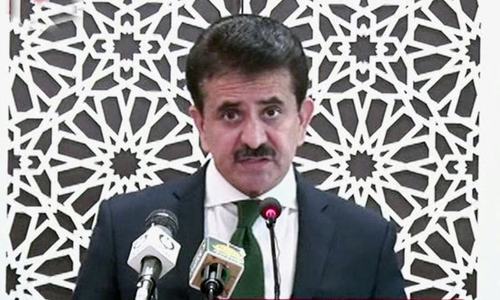THOUGH not exactly an icebreaker, the first major interview given by a senior Pakistani official to a major Indian news outlet since New Delhi revoked held Kashmir’s autonomous status last year signals that even in such gloomy circumstances, if the intent is there on both sides the peace process can be revived.
The interview featuring the Prime Minister’s Special Assistant on National Security Division and Strategic Policy Planning Moeed Yusuf, conducted by veteran Indian newsman Karan Thapar for The Wire, was indeed bumpy at times. However, Dr Yusuf’s revelation that India had sent feelers for talks with Pakistan indicates that behind the constant nationalistic bombast emanating from New Delhi, there may be a desire to reopen the channels for dialogue.
As Dr Yusuf pointed out, the core issues affecting bilateral ties remain Kashmir and terrorism. While many in India like to repeat the mantra of Pakistan sponsoring cross-border terrorism, the SAPM revealed that this country had evidence that India was involved in the 2014 APS tragedy. Moreover, with a right-wing Hindu nationalist set-up controlling the levers of power in New Delhi, the anti-Pakistan rhetoric has reached a fever pitch.
But, it is never too late to climb down, for South Asia can ill afford a perennial state of conflict the Pakistan-India dispute engenders. He added that Pakistan stands for peace and regional growth, and that this country wants to open the trade corridor on its eastern border.
Talks must be meaningful and issue-based. They should not be used as a cover by India to distract the world, particularly from the grim situation in held Kashmir, simply to show the global community that New Delhi is doing all it can to bring peace to South Asia. As the Pakistani official mentioned, there has to be solid intent on the Indian side. Dialogue in itself is not a sign of normalisation; this region has witnessed many episodes where peace was in sight, only for the dream to be dashed before the goal was achieved.
Having said that, and without prejudice to Pakistan’s principled stand on the Kashmir question, talks should not be preconditioned. Let the process begin and see where it goes. If both sides list lengthy preconditions before the talks commence, there will be little chance of success. In such circumstances, especially when trust levels are low, backchannel diplomacy may be an option. The SAPM had a point when he said that should Pakistan and India fail to sort out their issues, this region will be left behind.
Indeed the demand for “real dialogue” is a genuine one. Perhaps if the ‘soft’ issues are addressed first — Sir Creek, people-to-people contacts — progress can be made on the core problems. However, if the stalemate is left as it is, the small window for peace in South Asia may close soon, and it is anybody’s guess when it will open again.
Published in Dawn, October 15th, 2020















































